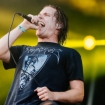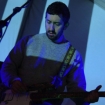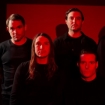"The thing about your band being successful," says Deafheaven guitarist Kerry McCoy, "is that, before it happens, you really think, 'I'll do this, and then I'll be stoked!' But that feeling never goes away. If we get a big tour, or our show sells out, or our record gets a good review, there's like six seconds of 'Oh, that's great!' and then you're just used to it—and now you want the next thing."
If any band has earned the right to revel in its good fortune, it's Deafheaven. Formed in San Francisco by McCoy and vocalist George Clarke in 2010, the band endured several years of poverty, lineup changes and shoestring-budget tours before their second album, 2013's Sunbather, unleashed a veritable tsunami of critical acclaim for its envelope-pushing stew of black metal, shoegaze and post-rock, which in turn resulted in sold-out club dates and choice music festival slots across four continents. Revolver named Sunbather No. 2 in the annual Album of the Year listing (the runner-up to Black Sabbath's 13) and earned the duo a nomination as Best New Talent at the 2014 Revolver Golden God Awards.
But while the gratifying success of Sunbather allowed McCoy and Clarke to trade in their food stamps-abetted existence in San Fran's Mission District—where they shared a cramped apartment with six other roommates—for a more comfortable existence in Los Angeles, you wouldn't know it from New Bermuda, Deafheaven's much-anticipated follow-up to Sunbather. Aside from a musical attack that's more intrinsically "metal" than that of their previous albums (with Slayer-, Metallica- and Morbid Angel-influenced riffs far outnumbering spacy experiments with reverb and delay pedals), it's the unremitting bleakness of New Bermuda that hits hardest—a sense of disillusionment in epic tracks like "Brought to the Water," "Baby Blue" and "Gifts for the Earth" that stems, in part, from the realization that true success and satisfaction are mirages that will always remain tantalizingly out of reach.
"New Bermuda is the place where you think everything is going be good," Clarke explains. "You keep swimming, and you're trying to get there; but ultimately, you don't make it... It's sort of the woes of adulthood," he continues. "I really appreciate our success, but now I have these adult responsibilities, and these stresses that I've never dealt with before—just all this reality coming down at once."
For Deafheaven, whose lineup also includes drummer Dan Tracy, bassist Stephen Lee Clark, and guitarist Shiv Mehra, one of the unfortunate adult realities that reared its head in the wake of Sunbather's success was that the band would have to crank out a new album in just a fraction of the time that it took to write and record their previous full-length. After a year and a half of touring, McCoy had only written two of the five sprawling songs that would eventually comprise New Bermuda, and had only a few months to come up with the others before the band was due to enter the studio in the spring of 2015.
"The thing that sucks is, you're aware that you're rushing something that should not be being rushed," McCoy laughs. "We pretty much just spent all of the end of February through all of March writing and rehearsing the songs, and then all of April just going to the studio every day."
Deafheaven recorded New Bermuda at Palo Alto's Atomic Garden Recording and 25th Street Recording with producer Jack Shirley, who'd also helmed their two previous albums. The intense pressures of the recording deadline caused McCoy to constantly second-guess his progress—"It was like, 'Does this really work, or are we just rushing to get it done?'"—before finally putting his trust in Clarke and Tracy's assurances that the new music was indeed on the right track.
"It really helps to have people like George and Dan in the band," says McCoy. "I don't think Dan has ever second-guessed anything in his life! We'll get done with a song, and he'll be like, 'Killer, dude! Awesome song!' And I'm like, 'Are you sure? I feel like this is kind of phoned in.' 'Nah, man! Not at all!' Dan kind of balances me out that way; he's like the blind 'We rule! People are gonna love this!' guy. While George is the guy who, if he's stoked off of it, I know he knows enough about what he's talking about that it's gonna be good. It's only when George gets kind of worried that I'm like, 'Oh, shit!'"
"When we were writing the record, Kerry and I were having these conversations about how we were both waking up in the middle of the night, really stressed," Clarke admits. "I would have stress dreams about the record! But I think it really just goes to show how much we care, I mean, like, to a really terrible degree," he laughs. "I feel like, if you don't approach what you're doing in that way, you just don't care enough."
Though Deafheaven certainly isn't the first band to meld intense metallic riffing with shoegaze sonic vistas, they may be the most popular to do so—and the most polarizing, as well. Pull up any Deafheaven-related comments thread on the Internet these days, and it will surely include both fulsome testaments to their brilliance and bitter accusations that they merely play "hipster metal" or watered-down iterations of black metal. While comments of the latter sort simply cause the band members to roll their eyes ("That's, like, the most boring thing to me," says Clarke), it should be noted that Deafheaven love black metal deeply and genuinely, even they feel no need to prove it by wearing, say, spiked gauntlets and corpse paint.
"No one comes out of the womb listening to Archgoat," laughs McCoy, but Clarke certainly got into black metal at a younger age than many. "I stumbled on it in middle school while looking for the scariest cover art I could find," he recalls. "If it looked extreme, I would buy it. So really early on, it was, like, Cradle of Filth and Dimmu Borgir, Marduk, Naglfar and Old Man's Child, that kind of thin —the sort of blackened death with the high production, a little symphonic and kind of cheesy, but I loved it. That stuff helped shape my listening, sending me back to the classics and getting familiar with the second wave of black metal. I also got really into thrash at a young age; I was listening to Slayer and Metallica, and then I'd hear like a Bathory record or a Venom record, and I kind of expanded that way, as well."
McCoy, for his part, was more into punk rock until his mid-teens, around the time that he and Clarke met while in high school in Modesto, California. "I never had that older brother or older friend who showed me stuff, so my only exposure to metal was nu-metal," he remembers, "and I didn't like that stuff at all. I remember, right before I met George, a friend of mine gave me a copy of Slayer's Reign in Blood, and I was like, 'Oh, this is almost punk! Metal can be cool, too!'"
Clarke and McCoy were soon bonding over a variety of metallic sounds, with Burzum becoming an important touchstone for both. "For me, it was not so much the aesthetic, but the music," reflects McCoy. "I was kind of searching for who was genuinely dark, and not just cartoony. I remember seeing the video for 'Dunkelheit' by Burzum—and it almost felt like the video was casting a spell on you. I liked the atmosphere and the vibe that it had. It was a dark thing, but it wasn't, like, Marilyn Manson dark. It was kind of gnarly, you know?"
From 2006 to 2009, Clarke and McCoy—the latter of whom was playing bass at the time—played together in Modesto grindcore band Rise of Caligula. But when that band fell apart, the pair decided to start a new project with McCoy on guitar.
"There wasn't really a clear concept, honestly," Clarke recalls. "We weren't trying to make a statement, or anything; we just wanted to write songs in the way that we thought we could."
"When we first started Deafheaven, we were listening to a lot of French stuff like Alcest and Amesoeurs and that whole scene, and some of the German bands like ColdWorld and Lantlôs," says McCoy. "That and a lot of the classic second-wave stuff, like Burzum. And then, of course, shoegazer bands like Slowdive and My Bloody Valentine—they'd heavily influenced Alcest as well as us, but that was also kind of like the base point of where we wanted to start from. I was like, 'Oh! It's kind of interesting that you can do this take on this kind of music. What if we did that and put our own spin on it?' That just led us more and more into the various directions that we could take the band in."
As Deafheaven continue to work metal influences into their music in adventurous and uncompromising way —and if that may be too "outside the box" for those who would keep musical genres rigidly walled off from each other, their approach has certainly garnered raves from a wide variety of respected metal musicians, including Godflesh, who played Japanese dates with the band in 2012.
"I had a long talk with J.R. [Hayes] from Pig Destroyer a few months ago, and he told me how much he liked what we were doing," marvels Clarke. "And I've liked Pig Destroyer since I was a teenager, so it was like, 'Whoa—you've heard of us!?'"
Ultimately, McCoy says, "The negative stuff has never really bugged us, because we know who we are, and the people who matter to us most know who we are. I've never claimed to be the most kvlt dude in the world, but I definitely know what black metal is, and I know what I'm talking about when I talk about it.
"The funniest part of it is that, half the time, the people that are talking shit about us on the Internet are name-dropping bands that we've talked to, who like us. For example, I remember we got an email from the dude from Drudkh when Sunbather came out, saying that he wanted to trade vinyl. So it's kind of like, "If you actually knew us, we would probably be friends!'"












